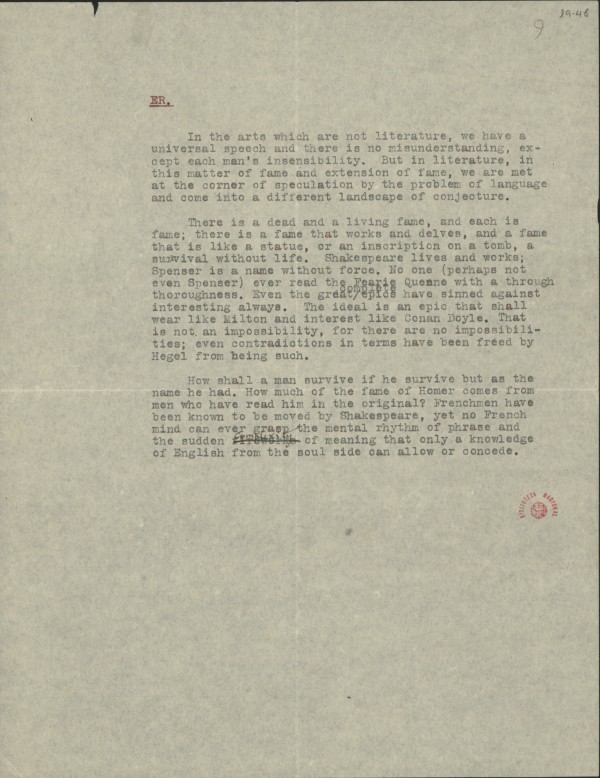Identificação
[19 – 46]
Erostratus.
In the arts which are not literature, we have a universal speech and there is no misunderstanding, except each man’s insensibility. But in literature, in this matter of fame and extension of fame, we are met at the corner of speculation by the problem of language and come into a different landscape of conjecture.
There is a dead and a living fame, and each is fame; there is a fame that works and delves, and a fame that is like a statue, or an inscription on a tomb, a survival without life. Shakespeare lives and works; Spenser is a name without force. No one (perhaps not even Spenser) ever read the “Faerie Queene” with a thorough thoroughness. Even the great complete epics have sinned against interesting always. The ideal is an epic that shall wear like Milton and interest like Conan Doyle. That is not an impossibility, for there are no impossibilities; even contradictions in terms have been freed by Hegel from being such.
How shall a man survive if he survive but as the name he had. How much of the fame of Homer comes from men who have read him in the original? Frenchmen have been known to be moved by Shakespeare, yet no French mind can ever grasp the mental rhythm of phrase and the sudden complexity of meaning that only a knowledge of English from the soul side can allow or concede.
[19 – 46]
Heróstrato.
Nas artes que não são literatura, temos um discurso universal e não existe nenhum mal-entendido, excepto a sensibilidade de cada homem. Mas em literatura, neste assunto da fama e da extensão da fama, encontramos à esquina da especulação o problema da linguagem e entramos numa diferente paisagem da conjectura.
Existe uma fama morta e uma viva e cada uma é fama; existe uma fama que opera e que se aprofunda e uma fama que é como uma estátua ou uma inscrição numa tumba, uma sobrevivência sem vida. Shakespeare vive e opera; Spenser é um nome sem força. Ninguém (talvez nem mesmo Spenser) alguma vez leu a “Faerie Queene” com rigor completo. Mesmo os grandes épicos completos pecaram por não terem interessado sempre. Isso não é uma impossibilidade, pois não existem impossibilidades; mesmo as contradições nos termos foram libertas por Hegel de o serem.
Como poderá um homem sobreviver se ele sobreviver apenas pelo nome que tem. Quanto da fama de Homero vem de homens que o leram no original? Sabe-se que os franceses foram impulsionados por Shakespeare, contudo, nenhuma mente francesa poderá alguma vez compreender o ritmo mental da frase e a súbita complexidade de significado que apenas um conhecimento de inglês do lado da alma pode permitir ou conceder.


